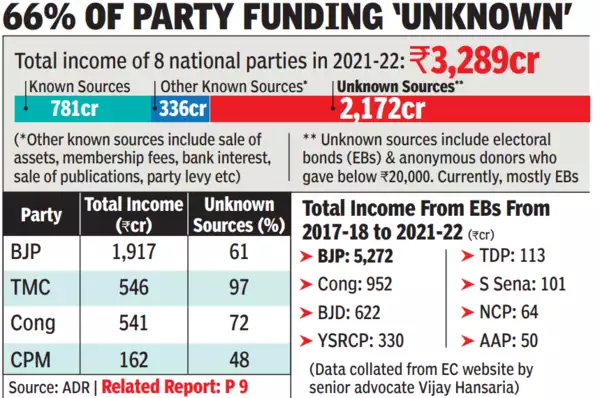Ahmedabad
(Head Office)Address : 506, 3rd EYE THREE (III), Opp. Induben Khakhrawala, Girish Cold Drink Cross Road, CG Road, Navrangpura, Ahmedabad, 380009.
Mobile : 8469231587 / 9586028957
Telephone : 079-40098991
E-mail: dics.upsc@gmail.com

Political Funding in India
News: Recently, in the context of current political circumstances and concerns regarding donations, the conclusion of the Supreme Court hearings on the challenge to electoral bonds prompts a critical examination of the potential impact this challenge’s resolution may have on democracy and the rule of law in India.
What is Political Funding?
• Political funding refers to the process of raising and spending money for political campaigns, parties, or candidates. This funding is crucial for the functioning of any democratic political system.
Statutory provisions in India
• Representation of the People Act, 1951 (RPA Act): It outlines rules regarding elections, including provisions on election expenses, contributions, and account maintenance.
• Companies Act, 2013: It regulates corporate donations to political parties, specifying contribution limits and mandating disclosure in financial statements.
• Income Tax Act, 1961: it governs tax treatment of political parties and donors, with compliance requirements and potential tax benefits for contributors.
What are the methods of raising Political funding in India?
• Section 29B of RPA: It allows political parties to receive individual donations with taxpayers eligible for a 100% deduction.
• State Funding: It is of 2 types i) Direct Funding (Government provides funds directly however it is prohibited in India) and ii) Indirect Funding
• Corporate Funding: In India, donations by corporate bodies are governed under section 182 of the Companies Act, 2013.
• Electoral Bonds Scheme, 2018
• Electoral Trusts Scheme, 2013
What is the need for Disclosure in Political Funding?
• The introduction of electoral bonds in India has brought complete anonymity for political donors which is in contrast with International Practices where full disclosure of political donations is a prevailing requirement. For example, The European Union, in 2014, enacted regulations on funding European political parties, emphasizing limits, disclosure mandates, and immediate reporting for large contributions.
• Most legal regulations globally converge on two fundamental requirements for political party funding i) comprehensive disclosure of donors above specific minimal amounts and the imposition of limits or caps on donations. These measures aim to ensure transparency, prevent corruption, and maintain public confidence in the political system and democracy.
• The equitable playing field gets eroded when one party has indomitable access to excess campaign finance. Disclosure ensures that all parties have equal opportunities.
• Without disclosure, money can become a tool for unduly influencing the political process. Disclosure helps prevent the co-optation of politics by business interests and widespread vote buying.
What reforms are necessary in Political funding?
• Importance of Electoral Justice: Electoral justice is crucial for upholding democracy, ensuring that all aspects of the electoral process align with the law and protect the enjoyment of electoral rights.
• Address the issue pertaining to Electoral bonds scheme. Electoral bonds, allowing for undisclosed donor details, pose a threat to democratic transparency and the integrity of free and fair elections.
• State funding involves the government providing financial support to political parties and candidates, derived from public resources. It aims to reduce reliance on private donations, minimizing potential influence from vested interests in political campaigns.
Other reforms:
• Identify donors above a specified nominal limit.
• Mandate immediate reporting of significant donations to the election commission.
• Ensure transparency by publicizing political party accounts.
Conclusion
• Reforms should not only address legal aspects but also focus on preserving democratic values, ensuring fair elections, and minimizing the impact of money on the political process.

Address : 506, 3rd EYE THREE (III), Opp. Induben Khakhrawala, Girish Cold Drink Cross Road, CG Road, Navrangpura, Ahmedabad, 380009.
Mobile : 8469231587 / 9586028957
Telephone : 079-40098991
E-mail: dics.upsc@gmail.com
Address: A-306, The Landmark, Urjanagar-1, Opp. Spicy Street, Kudasan – Por Road, Kudasan, Gandhinagar – 382421
Mobile : 9723832444 / 9723932444
E-mail: dics.gnagar@gmail.com
Address: 2nd Floor, 9 Shivali Society, L&T Circle, opp. Ratri Bazar, Karelibaugh, Vadodara, 390018
Mobile : 9725692037 / 9725692054
E-mail: dics.vadodara@gmail.com
Address: 403, Raj Victoria, Opp. Pal Walkway, Near Galaxy Circle, Pal, Surat-394510
Mobile : 8401031583 / 8401031587
E-mail: dics.surat@gmail.com
Address: 303,305 K 158 Complex Above Magson, Sindhubhavan Road Ahmedabad-380059
Mobile : 9974751177 / 8469231587
E-mail: dicssbr@gmail.com
Address: 57/17, 2nd Floor, Old Rajinder Nagar Market, Bada Bazaar Marg, Delhi-60
Mobile : 9104830862 / 9104830865
E-mail: dics.newdelhi@gmail.com